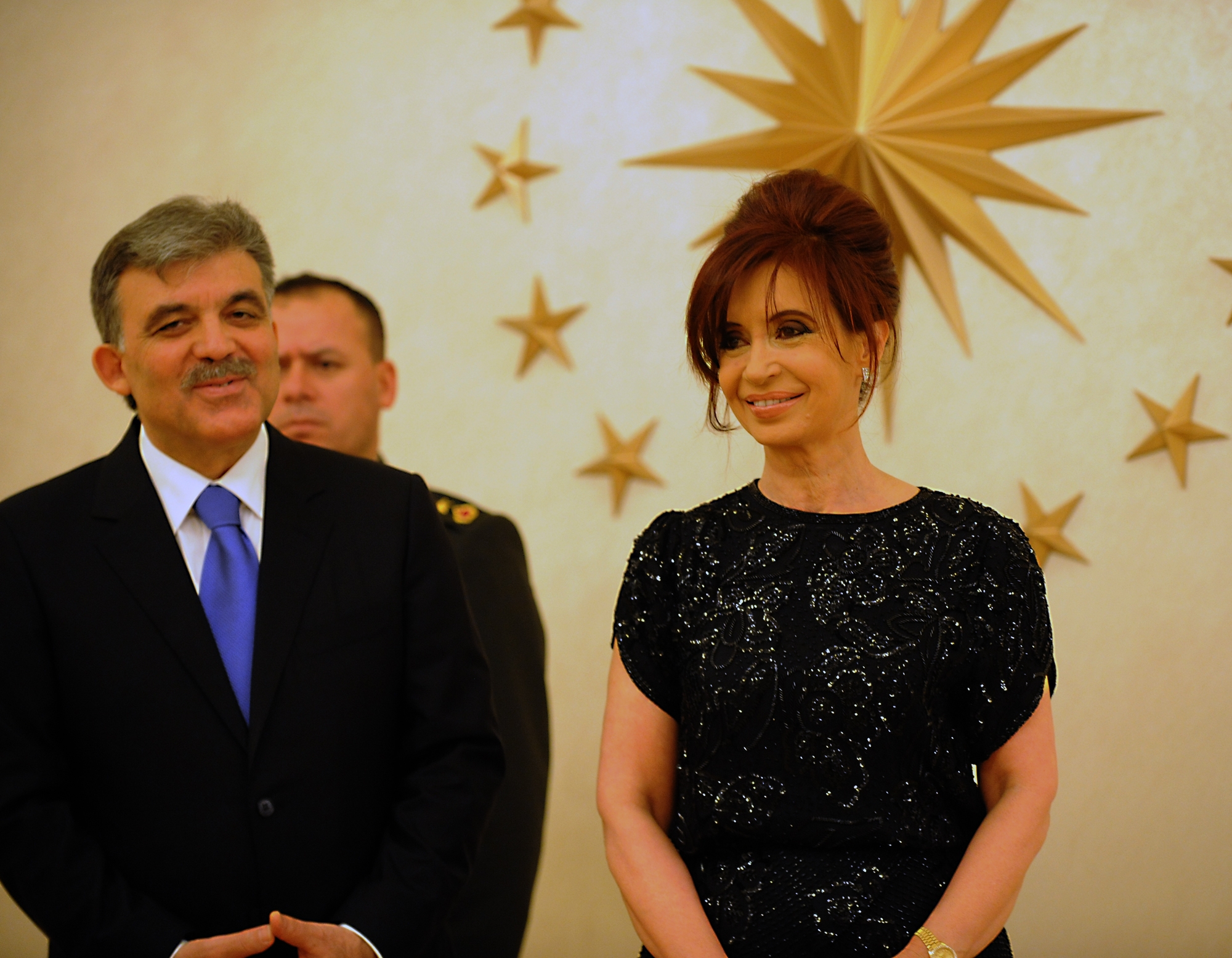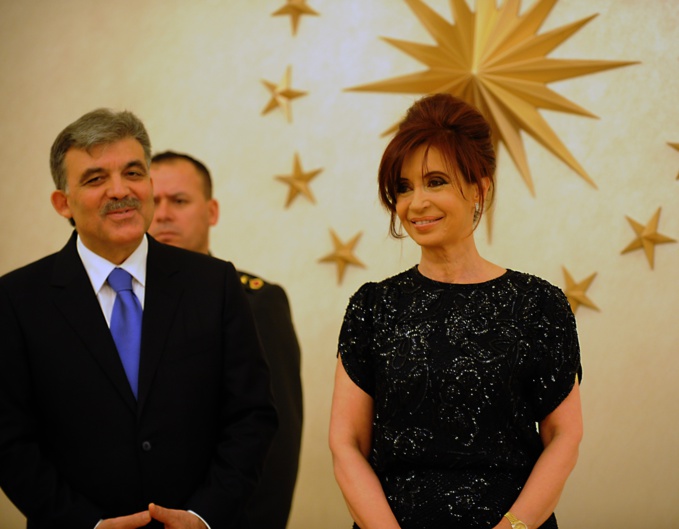Christina Kirchner was the wife of Nestor Kirchner, who held the presidency from 2003 to 2007. In 2010, Nestor Kirchner passed away. The accusation against Mrs. Kirchner states: "During the reign of Nestor Kirchner, a system of illegal receipt of funds was created, which continued to operate during the reign of his wife." The prosecution also states that Kirchner organized corruption schemes and their main beneficiaries.
The corruption scandal broke out in August, when the Argentine newspaper La Nacion published so-called “corruption notebooks”. Oscar Centeno, a driver of Julio Miguel de Vido, former minister of planning in the office of Kirchner, recorded delivery of bags of money to buildings of the authorities and to Kirchners’ houses. It is assumed that this money was a bribe that entrepreneurs working in the construction business paid them to receive large government contracts.
The records were kept in notebooks in a 96-sheet box for ten years. The driver recorded the exact time of delivery, address, name of the addressee, amount, sometimes even weight of money.
He handed over eight notebooks with notes to Le Nacion at the beginning of the year. The material was being prepared for publication for several months. According to calculations of journalists, the total amount of funds referred to in the notebooks is about $ 56 million. According to the prosecutor’s office, the total amount of bribes was even higher, about $ 160 million.
Christina Kirchner herself says that the case against her is politically inspired. Upon learning of the court decision, she wrote on Twitter that the incumbent president Mauricio Macri, the Cambiemos ruling coalition and the Clarin newspaper are behind the charges against her.
The scandal with kickbacks from construction contracts affected the family of President Macri. A week ago, his father Franco and brother Gianfranco were summoned to testify whether the corruption component was involved in receiving orders for the construction of highways by Autopistas del Sol Company, which is part of the Macri Group family business. The case of corruption also involves President’s cousin, businessman Angelo Calcaterra, the former owner of the construction company IECSA. He confessed in August, admitting that he had given bribes to politicians. It is Calcaterra who is the current owner of the Macri Group, although in Argentina it is widely believed that the company still remains under control of President.
At the court hearing last Thursday, Judge Bonado petitioned for the arrest of the ex-president, but as the current senator, Ms. Kirchner has immunity from arrest. It is unlikely that she will be deprived of her mandate, as she enjoys great support among senators. In August, the Senate voted only for the partial deprivation of its immunity. As a result, the police were able to search her three houses. Without a complete lifting of immunity, Christina Kirchner will remain out of prison, even if the court finds her guilty.
The case of the “corruption notebooks” is not the only trial against the ex-president Kirchner. Hearings for another corruption case are scheduled on February 26, 2019. The ex-president is accused of having helped a close friend of the family, businessman Lázaro Baez, to receive government orders for construction of infrastructure projects in the province of Santa Cruz. According to investigators, in exchange for this, Lazaro Baes paid part of the contract amount to the Kirchner spouses. The total amount of all contracts received by Lazaro Baez for 2008–2013 is about $ 900 million. The cost of the work was allegedly overestimated by 15%. The money received by Nestor and Kristina Kirchner, allegedly was laundered through fictitious rental of real estate objects.
Money laundering charges are set aside in separate legal proceedings. The ex-president is also accused of involvement in fraud at the Central Bank of Argentina, illegal enrichment, embezzlement of public funds.
Cristina Kirchner says that all accusations against her are witch hunt, initiated by President Macri for the sake of victory in the upcoming general elections in October 2019. Mauricio Macri, in his turn, has been saying for several years now that he cannot influence the independent judicial system.
The trial date for the corruption notebooks has not yet been set. If in the case of kickbacks in the province of Santa Cruz Christina Kirchner is found guilty, the court’s verdict can be appealed in three instances, including the Supreme Court. There are ten months left before the general election in Argentina.
source: reuters.com, telegraph.co.uk
The corruption scandal broke out in August, when the Argentine newspaper La Nacion published so-called “corruption notebooks”. Oscar Centeno, a driver of Julio Miguel de Vido, former minister of planning in the office of Kirchner, recorded delivery of bags of money to buildings of the authorities and to Kirchners’ houses. It is assumed that this money was a bribe that entrepreneurs working in the construction business paid them to receive large government contracts.
The records were kept in notebooks in a 96-sheet box for ten years. The driver recorded the exact time of delivery, address, name of the addressee, amount, sometimes even weight of money.
He handed over eight notebooks with notes to Le Nacion at the beginning of the year. The material was being prepared for publication for several months. According to calculations of journalists, the total amount of funds referred to in the notebooks is about $ 56 million. According to the prosecutor’s office, the total amount of bribes was even higher, about $ 160 million.
Christina Kirchner herself says that the case against her is politically inspired. Upon learning of the court decision, she wrote on Twitter that the incumbent president Mauricio Macri, the Cambiemos ruling coalition and the Clarin newspaper are behind the charges against her.
The scandal with kickbacks from construction contracts affected the family of President Macri. A week ago, his father Franco and brother Gianfranco were summoned to testify whether the corruption component was involved in receiving orders for the construction of highways by Autopistas del Sol Company, which is part of the Macri Group family business. The case of corruption also involves President’s cousin, businessman Angelo Calcaterra, the former owner of the construction company IECSA. He confessed in August, admitting that he had given bribes to politicians. It is Calcaterra who is the current owner of the Macri Group, although in Argentina it is widely believed that the company still remains under control of President.
At the court hearing last Thursday, Judge Bonado petitioned for the arrest of the ex-president, but as the current senator, Ms. Kirchner has immunity from arrest. It is unlikely that she will be deprived of her mandate, as she enjoys great support among senators. In August, the Senate voted only for the partial deprivation of its immunity. As a result, the police were able to search her three houses. Without a complete lifting of immunity, Christina Kirchner will remain out of prison, even if the court finds her guilty.
The case of the “corruption notebooks” is not the only trial against the ex-president Kirchner. Hearings for another corruption case are scheduled on February 26, 2019. The ex-president is accused of having helped a close friend of the family, businessman Lázaro Baez, to receive government orders for construction of infrastructure projects in the province of Santa Cruz. According to investigators, in exchange for this, Lazaro Baes paid part of the contract amount to the Kirchner spouses. The total amount of all contracts received by Lazaro Baez for 2008–2013 is about $ 900 million. The cost of the work was allegedly overestimated by 15%. The money received by Nestor and Kristina Kirchner, allegedly was laundered through fictitious rental of real estate objects.
Money laundering charges are set aside in separate legal proceedings. The ex-president is also accused of involvement in fraud at the Central Bank of Argentina, illegal enrichment, embezzlement of public funds.
Cristina Kirchner says that all accusations against her are witch hunt, initiated by President Macri for the sake of victory in the upcoming general elections in October 2019. Mauricio Macri, in his turn, has been saying for several years now that he cannot influence the independent judicial system.
The trial date for the corruption notebooks has not yet been set. If in the case of kickbacks in the province of Santa Cruz Christina Kirchner is found guilty, the court’s verdict can be appealed in three instances, including the Supreme Court. There are ten months left before the general election in Argentina.
source: reuters.com, telegraph.co.uk



















